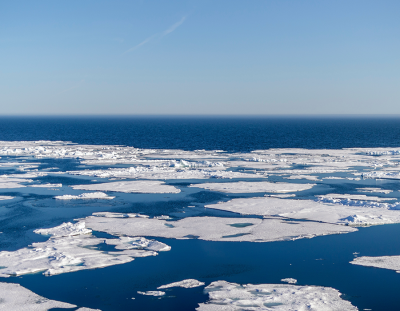CAMAS: New Consortium to Build Collaboration on Marine Arctic Science
Marine Arctic science workshop planned for February 2024
The Arctic climate is changing more quickly than anywhere on Earth. This accelerated warming has significant and unprecedented impacts throughout the Earth system. The ability to anticipate Arctic change is hampered by incomplete knowledge of the complex Earth system feedbacks that modulate Arctic warming and by the challenges of translating this knowledge into model fidelity.
A greater understanding of Arctic change is a goal for the Regional and Global Model Analysis (RGMA) program area’s High-Latitude Application and Testing of Earth System Models (HiLAT-RASM) project.
Working toward this goal, the HiLAT-RASM is organizing a new, multi-year series of workshops.
The newly established Consortium for the Advancement of Marine Arctic Science (CAMAS) will feature annual workshops to build international collaboration on marine Arctic science. The first CAMAS Workshop and Early-Career School will be February 13 to 16, 2024, in Santa Fe, New Mexico. There will be some remote sessions. Additional CAMAS workshops are expected in 2025 and 2026.
The annual meetings will focus on advancing understanding and model representation of critical marine Arctic processes that contribute to the rapid changes in the Arctic.
The registration deadline is January 8, 2024.
According to HiLAT-RASM Principal Investigator Wilbert Weijer, a physical oceanographer/climate scientist at Los Alamos National Laboratory, CAMAS workshops will focus on initiating, executing, and finalizing coordinated activities to advance understanding of:
- drivers and impacts of ocean heat and freshwater transport into and out of the Arctic
- ocean-ice-atmosphere interactions in a warming Arctic
- biophysical impacts of Arctic marine biogeochemistry
“We will be focusing on these three closely aligned themes to explore the processes that contribute to the rapid warming of the Arctic,” says Weijer. “We will examine the connection between the ocean and land, sea ice, and atmosphere—and not just from a purely physical perspective, but also considering the role that chemical and biological processes play in shaping the energy budget of the Arctic. Participants, for example, may concentrate on regional feedbacks between ocean sea ice and the atmosphere or explore the biophysical impacts of marine ecosystems.”
CAMAS workshop activities will leverage multi-model analysis, model-observational synthesis, and the development and evaluation of process-oriented metrics.
“Our goal is to bring marine Arctic scientists from around the world together and jointly decide on research activities to pursue,” says Weijer. “This may include organizing model intercomparison studies and developing the metrics to do so.”
Building from Past Efforts
The CAMAS workshops will extend synergies with the Interagency Arctic Research Policy Committee (IARPC) and build upon the goals and accomplishments of previous activities like the Arctic Ocean Model Intercomparison Project (2001-2011) and the Forum for Arctic Ocean Modeling and Observational Synthesis (2012-2018), funded by the National Science Foundation and Office of Naval Research.
Early-Career School and Workshop Registration
An Early-Career School will precede each workshop. The school will consist of lectures and activities on hot topics in the field, with ample discussion and social time. Some funding is available to support travel costs for early-career scientists.
Register for the CAMAS workshop by January 8, 2024. Participants are encouraged to submit an abstract during the registration process. Weijer says anyone with questions about the workshop should reach out to camas-workshop@lanl.gov, and for questions about the early-career school, to contact camas-ec-school@lanl.gov. For more information, visit https://cnls.lanl.gov/CAMAS.

